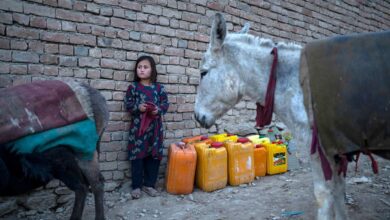
WASHINGTON, Oct 6 (Reuters) – She didn’t forget the prenatal vitamins – that was one of the few things this U.S.-trained Afghan pilot could grab from her Kabul airport office before she left the country aboard an Air Force plane during the Taliban takeover.
But after fleeing for her life and that of her unborn child in August, the 29-year-old says she can’t even get an ultrasound or visit a hospital.
Instead, she fears her son could soon be born into a strange kind of captivity in rural Tajikistan, alongside more than 140 other Afghan military personnel, almost all of them men, who flew across Afghanistan’s northern border together and are now being held at a sanatorium in the mountains.
“I am really, really worried about my baby,” said the Air Force pilot, whose situation was first reported by Reuters in September, in her first comments to a reporter.
She was speaking on a phone kept hidden from guards, after Tajik authorities took the Afghans’ identification documents and phones away. She asked to remain anonymous over fears for her family in Afghanistan.
Despite her mid-November due date, Tajik authorities have dismissed her request to be moved closer to a hospital that’s an hour or more away, she said.
“They say: ‘No. When your delivery time comes we will take you to the hospital and bring you back here’,” she said.
Her group has been detained in Tajikistan for nearly two months, hoping the United States will eventually fly them out of the country to be processed for refugee status in America. But for reasons that are not clear, that has not yet happened.
They say Tajik authorities keep telling them to wait.
Defense Secretary Lloyd Austin told a congressional hearing last week he was concerned about the pilots in Tajikistan and would work with the State Department to “see if we can move this forward.”
Republican Congressman Austin Scott, who raised the case of the pregnant pilot during the hearing, expressed frustration with the State Department’s handling of her case.
He said the department told his office the Tajik government was “very aware of the pregnant pilot’s condition” and that anyone needing emergency medical services would be taken to a local medical facility.
“Aside from that, they have been zero help with any of this,” Scott told Reuters.
The State Department said that it was “coordinating with the government of Tajikistan” on the matter but declined to explain the delay or why the pilots are being detained. The U.S. embassy in Dushanbe said in a statement that it visited the group and, at the time, “the pilots reported being treated well and conditions were humane.”
Pentagon spokesman John Kirby said the U.S. Defense and State departments were working closely together “as we pursue appropriate options for these pilots.”
“We believe we owe it to these brave individuals and their families to do what we can to help them relocate,” Kirby told Reuters.
A U.S. official, speaking on condition of anonymity, said it was complicated to get access to the Afghans at the sanatorium.
Tajikistan’s healthcare ministry declined to answer specific questions from Reuters about the situation or the delay, but said the sanatorium was staffed with medical workers.
BIGGEST TARGETS
U.S.-trained, English-speaking Afghan pilots were among the Taliban’s biggest targets during the war.
The Afghan air force personnel in Tajikistan are the last major group of such personnel abroad still believed to be in limbo after dozens of advanced aircraft were flown across the Afghan border to that country and to Uzbekistan in the final moments of the war.
Earlier in September, a U.S.-brokered deal allowed a larger group of Afghan pilots and other military personnel to be flown out of Uzbekistan.
Luckily, the pregnant Afghan pilot’s husband – who worked at the U.S.-backed government in Kabul – evacuated with her. But they feel trapped.
She said she feared medical personnel at the sanatorium, located outside Dushanbe, were not qualified to deal with pregnancies.
“We are like prisoners here. Not even like refugees, not even like immigrants. We have no legal documents or way to buy something for ourselves,” she said,
Reuters has learned that U.S. officials have started collecting biometric information to confirm the identities of members of the group, in a sign that help could be on the way. A similar effort in Uzbekistan preceded those pilots’ transfer.
But people close to the pilots say the United States still hasn’t collected biometric data on about a third of the group.
The pregnant pilot sounded relieved to report that an international organization this week dropped off winter clothes for the Afghans at the sanatorium, as well as lots of supplies for her baby, including warm clothes.
But that also meant she was bracing for the idea of a longer stay in Tajikistan.
“They are providing clothes and lots of things, so it means we are going to stay here,” she said, adding in a defeated tone: “I don’t know about the future.”
Reporting by Phil Stewart; Additional reporting by Nazarali Pirnazarov in Dushanbe; Editing by Mary Milliken and Sonya Hepinstall




